![]() Základní škola a mateřská škola Brno, Křídlovická 30b, Brno, Czech Republic
Základní škola a mateřská škola Brno, Křídlovická 30b, Brno, Czech Republic
Basic information
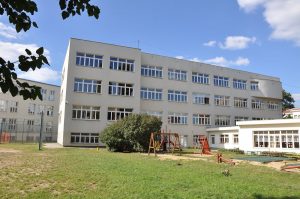 Křídlovická primary school is located in the center of Brno near ice hockey hall,
Křídlovická primary school is located in the center of Brno near ice hockey hall,- children attend our school from 6 to 15 years,
- in our school we teach children responsibility to themselves and to others, independence and cooperation,
- we give to all pupils individual care, we give them the chance to succeed,
- from the late seventies, pupils from the 6th to 9th grade (2nd stage) can study in classes with extended teaching of mathematics, science subjects and computer science.
In terms of the Czech language “Basic School and Kindergarten Brno, Křídlovická 30b” is situated almost in the middle of Brno, the capital of Southern Moravian Region. Our city Brno is also the second largest town in the Czech Republic with almost 370,000 inhabitants. The Southern Moravia Region is located in the southeast of the Czech Republic and is the country’s fourth largest region. South Moravia has two international borders – with Austria to the south and with Slovakia to the southeast. The school itself consists of three working places. The smallest unit is an associated kindergarten. There you can find about 700 pupils that are divided in two parts, the first grade (pupils from 6 to 10 years old) and the lower-secondary level (the 2nd grade) where the pupils are from 11 to 16 years old. Our students are taught by 40 teachers and cared after by other members of operating staff. The school works according to its own educational programme “Heuréka!“ and realizes following priorities: Maths, Science and ICTs classes in lower-secondary level (Chemistry, Physics, Biology and Geography labs, we have extra lessons of Chemistry, Physics and Maths), Teacher-training school of Faculty of Education Masaryk University, Project and Dalton education, Personal and social education, Education of gifted children – School Cooperating with Mensa, Language communication and foreign language education (English, German, Russian). In 1994 our school together with three other Brno schools started to implement Dalton principles of responsibility, independence and cooperation. Using the alternative (or innovative) teaching method clearly became popular; the Czech Dalton Association was founded in 1996. We are also a member of Dalton International organization which promotes innovative teaching all over the world ( http://www.daltoninternational.org/)
![]() Instituto de Educación Secundaria “La Azucarera”, Zaragoza, Spain
Instituto de Educación Secundaria “La Azucarera”, Zaragoza, Spain
- Our school is located in the Autonomous Community of Aragón , in the Northeast of Spain, halfway between Madrid and Barcelona. It is a Secondary Education Centre which hosts students from 12 to 18 years old. Such students are divided among the four courses of Secondary Education and the two courses of Bachillerato.
- IES La Azucarera is a quite new school (2006) which hosts 821 students and 19% of them are from foreign origin. As for the teachers, there are 81.
- The school has been Billingual in French since the academic year 2014-2015, and it is expected to become plurinlingual shortly. For that reason, Foreing Languages are important not only as subjects but also as languages used in other subjects.
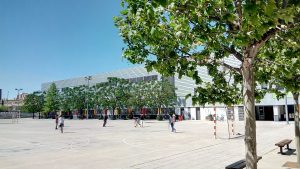
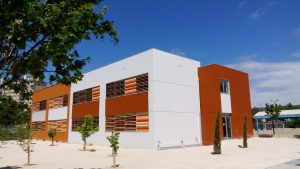
______________________________________________________________________________________
Moisio koulu, Salo, Finland
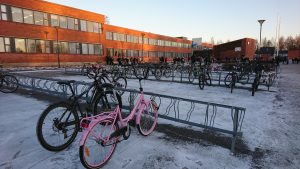
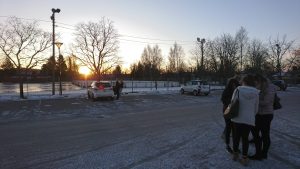
- Moisio school is one of the four junior high schools in Salo, with 580 pupils and 60 techers.
- School building was built in 1980 and it was renovated after a fire 2004. In the summer 2014 there were built an extension building.
- Students come to Moisio from Salo town area and also from countryside.
- Moisio school class facilities are good and functional, each class has modern educational equipment. There are three multimedia classes.
- Moisio school is specialized in an information technology and music. The students to these special classes are selected for entrance exams.
- You can also study many languages: the mandatory English and Swedish, as well as optional languages German, French, Russian and Spanish. Other optional subjects in our school are different kinds of music courses and a wide range of information technology courses.
- Our school has developed a new special education “room model”. The school has six special teachers, each with up to ten students.
- School is not just lessons, but also a variety of events, the ideas come mainly from students, like Color dates. Students also form the student council, members are from each class. We also have KiVa-team, that works against bullying.
________________________________________________________________________________
![]() Liceo delle Scienze Umane “Camillo Finocchiaro Aprile” Palermo – Italy
Liceo delle Scienze Umane “Camillo Finocchiaro Aprile” Palermo – Italy
- Our school is one of the many secondary schools in Palermo. It is located in a residential area mainly built during the 60s and 70s.
- It hosts about 900 students, mostly girls, from 14 to 18 years old who come from various parts of the city but also from neighbouring suburbs.
- It is divided into two sectors, HUMAN SCIENCES and SOCIO-ECONOMIC SCIENCES, but the general focus is on Anthropology, Psychology, Sociology and Law and Economy.
- In the last few years senior students (last three years) attend special internships to create a link between school and work.
- The school day starts at eight and finishes at two p.m. with a break at eleven but students are also involved into many vocational projects in the afternoon such as languages, art and social sciences courses. We also have a small school band which performs on special events at our school.


_______________________________________________________________________
![]() Hólabrekkuskóli, Reykjavik, Iceland
Hólabrekkuskóli, Reykjavik, Iceland
- Hólabrekkuskóli has around 510 pupils and 50 teachers. It is situated in one of Reykjaviks suburbs (Breiðholt).
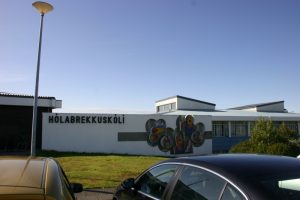
- The school was built in 1974, but has since then had three extensions. The pupils are from 6 to 16 years old.
- Our pupils live mostly in our neighborhood, with a very few exceptions.
- The school is one of the most progressive elementary schools in Iceland, but it also has traditional teaching.
- The teenagers have themework every Wednesday, where they work on various projects. They often use art, craft and IT to present their work and findings.
- The school has a Makerspace, were students can create projects, and they have access to tools such as a 3D printer, a vinylcutter, small computers (like Arduino and Microbits), and building materials of many different varieties.
- We teach coding in our school and use the facilities in Reykjavik´s Fab lab (which is in a building next door to us). There the pupils have access to bigger a vinylcutter, better 3D printers and i.e. lasercutters.
- Most of our pupils spend some time outdoors every day and have recess every 80 minutes, where they go outside and play. The teenagers do not have to go out during recess, but the younger pupils do. During a typical schoolday, our pupils have recess three times during the day. First for 20 minutes, then 10 and at last 30 minutes for a lunchbreak.
- Pupils get oatmeal in the morning (if they want) and they get a warm meal during lunch.
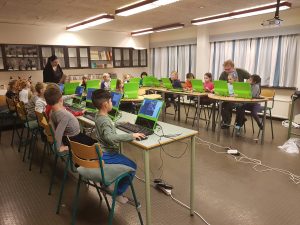
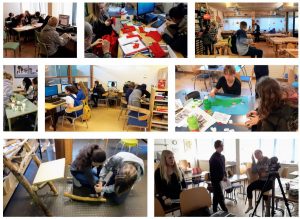
________________________________________________________________________________
![]() 1st General High School, Pyrgos Elias, Greece
1st General High School, Pyrgos Elias, Greece
- The “1rst General High School of Pyrgos Elias” is a public Senior High School of the city of Pyrgos, which is the capital of Perfecture of Ileia.
- The school is attended by about 250 students. The students age is 15-18 years old.
- The Curriculum includes Natural Sciences, Mathematics, Ancient and Modern Greek Literature, Social Sciences, English, French, Sports and ICT.
- In our school there are various clubs such as environmental, drama, dance and music, reading and sports clubs, so students are motivated to engage in a lot of extracurricular activities that help them to socialize, collaborate, share responsibilities and increase their self-confidence.
- Additionally, they edit a school newspaper and a lot of times have been organizing blood donation for the local hospital and bazaars for their poor schoolmates, cleaning of our port and beaches, and planting trees at regions that were damaged by extensive fires.

![]() Oostvaarders College
Oostvaarders College
About the OVC
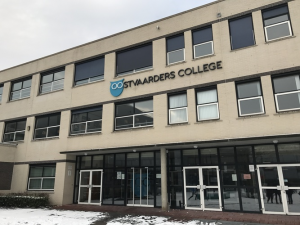 Our school is located in the city of Almere in the province Flevoland, the Netherlands. Almere is a new city only 35 years old, and our school is 25 years old.
Our school is located in the city of Almere in the province Flevoland, the Netherlands. Almere is a new city only 35 years old, and our school is 25 years old.
Prepare well for your future. That is our mission. For an important part, you yourself are involved in this. After all, you determine your future. The OVC helps you discover what suits you. Besides the good, interesting lessons, we therefore offer all kinds of extras such as talent classes, an electronic learning environment, and excursions and many sporting and cultural activities. In short, at the OVC you everything you can prepare for your future.
The best school for you: quality
The OVC is a nice school where you get good education. We are proud of it. Quality is important to us. That is why we give good, interesting lessons. Do you need extra help? We offer study help for every subject.
Knowing where you stand: clear
At the OVC you know where you stand. We are clear about what we do at school and clear about what we expect from you. That gives peace. That makes us a safe school. You can see the figures you have obtained online. Your parents can also log in. Is it a little less learning for a while? Then we can help quickly. That is clear too.
Especially for you: personally
The OVC is a school where you are seen. A big school where the teachers work in small teams. This way we ensure that the teachers really know you. What makes the OVC even more personal: you can choose your own route. Would you like to learn English very well? Do you enjoy sports, technology or art? Do you follow the news all day long? We help you to develop your talent. For that our talent classes.
Ready for later: future-oriented
Your future? It starts at the OVC. With us at school your talent gets the space. Step by step we learn to work independently and work well together with others. We use computers and online media to make the lessons even better. Excursions abroad help you understand other people and cultures. We are therefore not a UNESCO school for nothing. After your school time at the OVC you are ready for your future.

